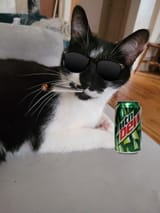Jim Milton Rides Again
or 'How I Learned to Be The Cowboy'

You would forgive me, I hope, for losing focus a bit. I've been meaning to write about the grandiose topics: 0n remakes and heartbreaks, religion in the marshes of Vvarvdenfell or "How to Hold Abolitionist Thought While Loving Kim Katsuragi" (working title). But the words aren't forming right. I've been too tied down: crippled by my own personal problems. I've been overworked in my day job; I'm exhausted with the real world.
My mind is dominated by thoughts on "America", spurred on by some minor news of slight national significance that occurred on November 5th. In a weird snake-n-ladders effect, these cognitive processes soon led me to pondering on the idea of the "Wild West" and the implementation of America as a nation.
Thinking of the Old West, there's only one videogame in mind that truly encapsulated the cowboy experience, and represented it with a certain moral weight and a surprisingly cogent narrative: Red Dead Redemption 2. In particular, there are two moments that permanently live rent-free in my head.
I want to write about "that" moment in Red Dead Redemption 2. More precisely, I want to write about "those" moments in the epilogue, where John Marston forsakes himself on the path of vengeance. The moments where John Marston, either by his own nature or his own brand of moral fiber, rejects mundanity and becomes a cowboy again, shaped by the "America" he has come to witness in his life.

The Van Der Linde gang are abolitionist, anti-civ anarchists, and I ain't afraid to say it. They despise authority, and want to partake in the dream of the Wild West, not in a colonizing or dominating way, but rather as a backdrop, so that they may live in resistance to the ever encroaching reach of civilization. It is a surprisingly diverse group for its time period: some of its most respected members are women, Black, Native American or Mexican, mingling in unity with White people, who defend them as equals under the racist system of America.
The game doesn't specifically detail Ducth (the leader) or its members' political ide0logy outside of a coherent anti-racist methodology, but through the gameplay and story we can get a clearer idea of what they're all about. They want to live off the land, resist against law and order and in a weird Machevillian spin, believe that might makes one right. The Wild West is only for the strongest, both physically and morally. Sure: they racketeer money from innocent individuals, rob banks and the game opens pathways for the player to commit atrocities and crimes "for the fun of it", but they're also staunch revolutionaries. This is their way of resisting the foundation of America--they're enacting violence to resist violence. This is what shaped Marston's moral core and attributed to him a nature he cannot escape.
I love me some tragic men. Arthur Morgan doesn't start the game a broken person, but for most of the game he is a dead man walking. Very early on in the story, he beats up a defenseless, dying man for money, from whom he contracts a deadly lung disease. This serves as the core of Arthur's moral dilemma towards the endgame. He reflects on his own immoral actions and his undying support of Dutch Van Der Linde (who is slowly losing his mind and abandoning his revolutionary ideology). The ultimate tragedy is that Arthur realizes that, no matter how much he tries to fight against it, civilization is rearing its ugly head towards the American frontier, bringing with it law and order, alongside all the brutality that entails. He cannot defy fate: he is dying and the Wild West is dying with him. The time of the cowboy is coming to an end.
As the main protagonist of the game, he is the one who ultimately imparts valuable lessons to John Marston, before the former's untimely death of tuberculosis. He imparts on Martson adages on the futility of senseless violence and the moral burden one carries when one chooses to live outside of the American system. He urges John to live a calm and peaceful life. He saves John and his family, giving them a chance to accomplish this goal. He dies on the wet ground, staring at one final sunrise. The game then jumps onto the Epilogue, where the perspective switches to John Marston, going under the name Jim Milton, in his new life moonlighting as a ranch worker.
The ultimate tragedy of the epilogue isn't its length or quality: I quite enjoy the epilogue's narrative beats. No: the tribulation at hand is that John Marston wastes his chances at a peaceful and calm life, because he realizes mundanity isn't for him. He has known only the smell of gunpowder and the beating heart of violent resistance. The America he knows is not calm: it is brutal, savage and kills its inhabitants.
He is a cowboy and a gunslinger, not a ranch-hand. Arthur thought the cowboy died with him, but John Marston's personal characterization supports the ideology imparted by the Van Der Linde gang. If someone messes with your farm, your friends or your family, you don't parlay or wait for the justice system--you shoot the sonuvabitch in the face.

The John Marston that walks into the new century is a man already burdened by the error of his ways. No matter how many promises he makes to his wife, Abigail, he cannot leave his gun behind or his willingness to use it in order to resolve conflicts. Following an incident that led to Marston killing a man in Roanoke Bridge, him and his family have fled to Strawberry. Soon after delivering some goods to Pronghorn Ranch (and recovering a stolen wagon) he is hired by the owner, David Gibbes, and given accommodations on the land.
The epilogue initially serves as an exposition on the Marston's family newfound mundane life on the run. You spend hours building fences with button mashes, riding on trails and corralling animals--basically anything and everything the game offers short of shooting a gun. It's quite a tonal whiplash after playing through Arthur's dying days embroiled in perilous gunfights. These slice-of-life moments serve to accentuate the incoming bloodbath.
Marston is a good enough hand. He is quiet, hard-working, but tends to get easily frustrated or bored. He's not the sort of guy that can just work a 9-5 after living his formative years as an outlaw and social divergent. Simply put: a simple, quiet life is not the sort of life he wants to live. It is fortuitous, then, that the Laramie Gang gives him a chance to flex his violent skills.
A gang of thugs, payed off by the neighboring, wealthy land-owners, are harassing David in an attempt to pressure him into selling off his land. After much back and forth, the Laramie Gang kills two of the workers and steal the entirety of the Gibbes' cattle.
The ranch can't go to the sheriff. Not only do they exist amidst the lawless Wild West, Marston is ideologically opposed to state-sanctioned justice. He has seen the ruins of civilization: the fumes of smoke polluting the skies, the poor and the hungry dying on the streets, the slaughtering of the Native Americans. He has witnessed his own friends and comrades butchered and massacred by sheriffs and Pinkertons. He knows that blood is the fuel of the new millennia, and in his world, blood is always met with blood.
Marston takes two men with him into the gang's hideout at Hanging Dog Ranch. This, is one of "those" moments. After hours of relative calmness, hammering away at nails and lassoing horses, you fire your first shot into the dome of a taunting goon. The twang of an electric guitar cuts through the stillness, joining the symphony of shouts and gunshots.
The musical accompaniment perfectly accentuates the action: the game's soundrack moved from solemn acoustic tones to a twanging electric sound, action-packed and luminous in its tempo. It provides a sizeable backdrop as Marston single-handedly butchers the Laramie gang. In one particular moment, he aims a sawed off shotgun at a wounded gangster, the shadows half-covering his face, an image reminiscent of the original game's cover art. This is no longer Jim Milton, the ranch-hand: we, the players, are seeing John Marston, the gunslinger, rise again.

Violence begets violence, Marston's actions have consequences that ripple into his personal life. Following the massacre at Hanging Dog, Abigail leaves him, taking their young son, Jack, with her. In an attempt to curry favor with his wife, he buys land, builds a homestead, tracks down Abigail and Jack, and convinces them he is a changed man. This is John Marston, devolving back into Jim Milton, half-intending to live a calm life, living off the land.
That is, until Sadie Adler, a former member of the Van Der Linde gang turned bounty hunter, informs Marston she has found the location of the traitor Micah Bell. A short recap: Micah Bell serves a moral foil to Arthur Morgan during the main story. He is ruthless, has zero remorse over taking innocent lives, creates trouble for the gang and infects Dutch Van Der Linde with whispers that ultimately aid in the leader abandoning his former comrades. Jim Milton immediately returns to embodying John Marston, and rides with Sadie and another former member of the gang, Charles Smith, to enact their long-sought vengeance.
They climb the snowy peaks of Mount Hagen during the game's climactic conclusion: American Venom. This is that other "moment". It's my favorite level in the game. Not only does it serve as a final skill-check, forcing you into a slow ascent with little cover, continuously assaulted and ambushed by enemy goons, it is the perfect thematic conclusion to the Epilogue.
The electric guitar returns, with a melody that reprises the one from the mission "Jim Milton Rides Again". Horns and drums add a bombastic element to the sound. It complements the violence perfectly, it fomented this epic feeling of insurmountable struggle and badassery, gunning down goons knee deep in heavy snow. It kickstarts the legend of John Marston as one of the most feared gunslingers in the Wild West.
After facing insurmountable odds, John comes face to face with the snake Micah Bell. I think you can surmise how it goes, with Bell dropping dead on the snow covered in bloody bullet-holes.
What was amazing about this level was the baseline emotional response I had. To this day, listening to the song that accompanies the missions gives me goosebumps. I constantly hear Marston's screams of "Micah! I am just here for Micah Bell!" echoing in my head. But the more I think about it, the more I wish Marston had stayed in his fucking ranch. The massacre at Mount Hagen ultimately leads the Pinkertons right to his doorstep, kickstarting the plot of the original game and portending his demise.

Red Dead Redemption 2 contemplates on violence, a critical element explored in spaghetti westerns albeit on a superficial (and at times, highly problematic) level. Violence in cowboy flicks is less about impact and more about characterization, in many cases used to establish a character as a feared gunslinger, a noble hero or a badass outlaw.
The violence on display, as John Marston ascends the snowy peaks, is similarly used to cultivate his character. He kills dozens of goons, all in the name of revenge, but it also digs deeper to re-inforce a cogent point: he is, and forever will be, a cowboy. Jim Milton never existed. He was a mirage, a facade, a warped mirror-image of the man Marston could never be.
In that shadow-identity lies his downfall. Marston could never live a happy life with his family. He is doomed to follow his own nature as a gunslinger. The violence he has come to witness is the same American venom that destroyed the Van Der Linde gang. Despite his progressive attitude (for the time), Marston is a sinner, and as much as Arthur Morgan tried to steer him on the path of tranquility in his final days, Marston ignored all his pleas.
Marston cannot escape violence. It reflects a sad reality of our times: we, too, cannot escape the violence in America. It is fair to say that while Arthur Morgan redeemed himself on his final days, Marston forsake himself shortly afterwards. He finds redemption in the chronological sequel Red Dead Redemption with his brutal, bloody, violent death, at the hands of the proto-police. I told you: violence begets violence.
The day Jim Milton rode again, was the same day Martson signed his death sentence.
The Dessert Cart
My latest Superjump article on the Silent Hill 2 remake was published earlier this month. I was very fortunate to get a press key from Konami and that I was able to experience one of my favorite games of all time under a new light. While my review is ultimately mixed, I commend Bloober Team for their success in the gargantuan task of remaking Silent Hill 2. If you're interested in reading my analysis, I've linked it below:

And speaking of Superjump, there's been some real bangers on there recently. The first article I want to show off is an excellent analysis by Bryan Finck of the rogue-like Sulfur. Truly, a masterclass of a review, one-hundred-percent worth your time.

Then there's Jacob Self's excellent piece on the interior human life and how different videogames explore the concept of the mind. Not only do I enjoy the fact Jacob explored some of my favorite games, like Pentiment and Psychonauts 2, the article is academically robust, as if pulled from a fictional videogame journal on JSTOR, complemented with some real personal pathos and gravitas. It was a stimulating read, please read below or I'll assume you lack poise and grace.

Oh, and, perhaps in a personal tit-for-tat kind of way, I will also share Lawrence Adkin's latest review on the new Kirby game from their website. They promoted my personal website on it and they made me, not only read, but enjoy a review on a game that I had zero interest in. This wouldn't be possible if Lawrence wasn't the gifted writer they are. Kudos to them for the brilliant words.

That's it for dessert. One more article next month to close out the year: my yearly roundup of my favorite games of 2024. I've expanded the selection to include my top ten games, including my GOTY for 2024. After that, I will be going on a much needed vacation.
Have a good one, stay safe and take care of each other.









